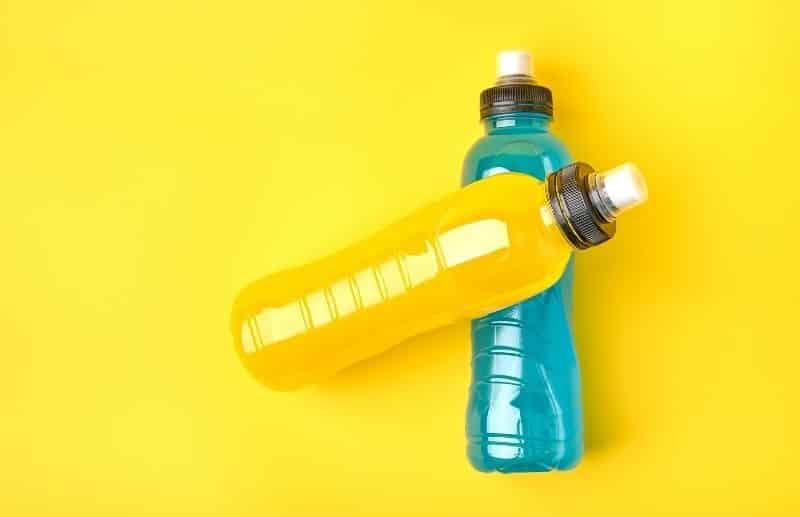If you are a runner, you have most definitely heard that hydration is important. Coaches will often tell athletes to pay attention to hydration, and stay on top of your water intake, but what exactly does that mean?
As a runner how much water is enough? When should you be hydrating? How do you even carry water while running? Why is water important for runners?
These are all very valid questions that this post will answer. This post will review topics regarding water for runners such as when, what, and how to drink water while running.
Let’s get into it!

Why is hydration important for runners?
Hydration is important for the overall health and well being of a runner. It is also important for performance.
Have you ever felt absolutely exhausted after your run or exercise? Although this may be multifactorial, dehydration can be a contributing factor.
Your body will sweat during high intensity exercise to limit the raising of your body temperature. The more you sweat the more risk of dehydration that occurs. This is because when you sweat you lose water and electrolytes.
The rate in which you lose sweat is called your sweat rate. We all have different sweat rates, which is a contributing factor in how much we need to drink to stay hydrated.
If you are dehydrated you may have a headache, muscle cramps, increased heart rate, and in more severe cases may feel lightheaded or dizzy.
To avoid these symptoms and negative toll on your body, hydration becomes key. Adequate hydration can help maximize performance and improve your recovery time.
Pre run hydration
If you are a runner, you should be thinking about hydration throughout the day whether you have a hard workout or not. You want to maintain hydration before your run, so you do not need to play catch up later. Water for runners is always important.
Some tips to improve hydration throughout the day include:
- Drinking through a straw
- Adding flavors to your water such as lemon or mint
- Adding flavor packets to your water
- Carrying a reusable water bottle with you everywhere
- Keeping water at a temperature you enjoy
Hydrating on the run
If you are training for a marathon or are running over 60-90 minutes, hydration becomes important during your run.
Generally, if you are going on shorter runs of less than 45 minutes, you would not need to hydrate during your run. With everything there are some exceptions, hydration during a shorter run may be necessary on a hot or humid day.
Additionally, if you are a heavy or salty sweater hydration may be important even if you are running for a shorter time.
Hydration on your run can consist of water or some sort of electrolyte sport drink. It is going to depend on what your fueling strategy is and if you need the additional electrolytes or carbohydrates from your drink.
For example, if you are taking a gel or other food source that contains electrolytes and carbohydrates on your run you may be fine to just drink water.
Whereas if you are not consuming something with these components, you may want to try something other than water to drink, such as a sports drink.
There is going to be a different plan for everyone, just be sure to practice your plan and find what works well for you prior to any races.
You will want to take up to 10 ounces of fluid every 15-20 minutes while you are running.
How to carry water while running
There are many items available on the market to help you carry water while you are running.
Some of my favorite options include:
- Using a hydration belt to hold bottles
- Hand held water bottle
- Hydration backpack or hydration vest
If you don’t want to buy anything new you can also leave bottles of water on your route. This works especially well if you are doing a loop.
If you are familiar with the area that you are running you can also map out your run knowing where water fountains are.
Another option includes having a friend or family member available on your route to give you some water. This will also help you practice for race day as there are often hydration stations set up during road races.
Finally, if you wear shorts or pants with pockets you can carry a bottle of water in your pocket. This is often my go-to as it does not require any additional products and is pretty easy to do. If you run out of water on the run you could find a water fountain to refill!
Hydrating post run
You have finished your run, great job, now it’s time to get some post run fuel and rehydrate. After your run may be a good time to rehydrate with a sports drink with added carbohydrates and electrolytes.
You most likely have lost some sweat during your run, and with that you have lost some electrolytes. You want to replace these lost electrolytes soon after your run.
If you are feeling nauseous after your run, try taking small sips of cold water to begin your rehydration process. It is important to get some fluids in your body, even if you are not feeling up to it.
You want to pay attention to your urine post run. The darker in color it is the more dehydrated you are. You want your urine to look light yellow, almost like lemonade, to show adequate hydration.
What should runners hydrate with?
There are many hydration options available to runners. The most common are water and sports drinks.
Water
The most common hydration tool is water. Most of the time water will be sufficient to keep you hydrated as a runner. Water for runners can be a great choice.
If the thought of plain water is unappealing, you can flavor it to make it more desirable!
Sports drinks
Sports drinks are important if you are a heavy sweater, if you are in the heat or humidity, or are running for greater than 45 minutes. When you sweat you lose electrolytes which are important to replace. You can replace them via sports drinks.
You may also not feel great and have a hard time fueling after a run, this makes sports drinks a good option to get some energy via the carbohydrates in the sports drinks.
Also, you may enjoy the flavor of sports drinks which may make you more likely to drink and stay hydrated. If this is the case, sports drinks are an acceptable choice.
There are plenty of options available on the market, including low or zero sugar options if needed.
Overhydration
Something to be aware of is the concern of overhydration. Overhydration can occur if you consume too much water. The main concern with overhydration is the dilution of sodium in your body which may lead to hyponatremia.
You can avoid this by not drinking too much water, and eating salty snacks or electrolyte/sports drinks for additional sodium.
Overhydration is rare in runners, but it still can occur and can be very dangerous. Look out for signs and symptoms of overhydration
Overview
Hydration is key in running. Runners need water and hydration in order to perform safely and at their highest ability.
You should pay attention to hydration before, during, and after your run.
If you are preparing for a race, try different hydration strategies during training so you will know what to do on race day.
As always, happy running 🙂
